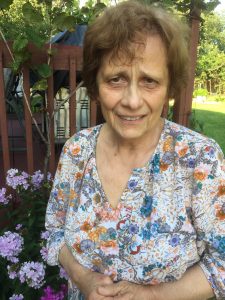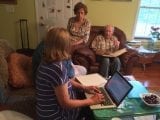- Local Survivor registry
- IRINA S. POLYAKOV
- Local Survivor registry
- IRINA S. POLYAKOV
Survivor Profile

IRINA
S.
POLYAKOV
(1939 - PRESENT)
PRE-WAR NAME:
IRA KANISHEVSKY
IRA KANISHEVSKY
PLACE OF BIRTH:
ROSTOV-ON-DON, RUSSIA
ROSTOV-ON-DON, RUSSIA
DATE OF BIRTH:
DECEMBER 25, 1939
DECEMBER 25, 1939
LOCATION(s) BEFORE THE WAR:
ROSTOV-ON-DON, RUSSIA
ROSTOV-ON-DON, RUSSIA
LOCATION(s) DURING THE WAR:
PYATIGORSK, ROSTOV-ON-DON
PYATIGORSK, ROSTOV-ON-DON
STATUS:
CHILD SURVIVOR, REFUGEE
CHILD SURVIVOR, REFUGEE
RELATED PERSON(S):
VLADIMIR POLYAKOV - Spouse,
SAMUEL KANISHEVSKY - Father (Deceased),
KIRA KORJOVA KANISHEVSKY - Mother (Deceased),
MICHAEL (MISHA) POLYAKOV - Son,
RIFKA, RENA, ELLIE, LEVI - grandchildren ,
ELIANA, NATI - great grandchildren
-
BIOGRAPHY BY Vladimir polyakov
Editor’s Note: Refer to Vladimir’s Polyakov’s Registry, Irina’s spouse,
This story is about “Evacuation” of a two-year girl Ira Kanishevsky, who subsequently became my wife, Irina Polyakov, the daughter of the Jew Samuel Kanishevsky and the Russian woman, Kira Korjova, but the story was different. Before the first occupation of Rostov, Ira, her mother and grandmother were evacuated from Rostov to Pyatigorsk.
After the first Nazi occupation, they returned home when Rostov was liberated. The Germans soon reoccupied Rostov-on-Don on July 1942, and in August the Nazis began to destroy the Jews in the city. They caught and shot them in the Zmievskay Balka. (“Russian Babi Yar” in Rostov-on-Don where more than 20,000 people were killed. The greatest number of victims, including poisoned children, died in 1942 on August 11th and 12th).
Irina Polyakov explains:
“One of our neighbors warned my grandmother that another neighbor went to the Germans to tell them about the Jews in neighborhood. My mom grabbed me very quickly, and we ran to the outskirts of town to hide at the house of our Russian relatives.
We stayed there until the Soviet Army came and liberated Rostov. All that time, my father Samuel Kanishevsky was in the Army fighting against the Nazis.”
Editor’s Note: For complete testimony, refer to Vladimir’s Polyakov’s Registry titled, “Biography Evacuation.”
-
SURVIVOR INTERvIEW:
IRINA POLYAKOV INTERVIEW
Date: August 1, 2017
Location: Polyakov residence
Interviewer: Nancy Gorrell
Translator: Elena Volkova
Q: Describe your family background.
My grandfather was a tailor, and my grandmother was a housewife. My father was from Mariupol, and my mother was from Rostov-on-Don. My father was one of five siblings and my mother was one of two siblings. My father was born in 1909; he was just a teenager during the Revolution. His family moved to Rostov after the Revolution. After the Revolution, my father had the chance to go to school for working class people. He became a supplier for construction and manufacturing materials. My father was a communist.Q: What happened in the year, 1937 in Russia?
My father was a communist. The year 1937—so many were arrested. My father was arrested and returned without any teeth. His name sounded Polish. He was arrested and beaten but not killed. Stalin ordered the arrest of so many specialists. That’s why by the wartime, the Russian people were already so beaten. My father fought in the Soviet army all through the war.Q: Describe your schooling.
I went to public school after the war like the others and then the university to study engineering. There I met my future husband, Vladimir.Q: Did you have any siblings?
I had one brother, Oleg. He was born after the war.Q: What was life like growing up in post-war Rostov-on-Don?
My grandmother lived in a small hut. Then my father got some apartment. My parents were poor. I studied in a great school. Anti-Semitism? I didn’t feel it when I when I was very young.Q. Did you know you were Jewish?
I went to an all girls’ school. Kids were telling me I was Jewish. I asked my grandmother, “Is it true we are Jews?” My grandmother said, “I’m Russian.” She wasn’t Jewish. In Russia our nationality was defined by fathers. Whatever your father was, you were. I was Jewish because my father, Samuel, was Jewish.Q: Was there a synagogue in Rostov?
There was one synagogue. It was closed and Vladimir sneaked in. In the basement were shoemakers. There were no rabbis in the synagogue. It wasn’t officially forbidden to go there, but KGB made lists of those who went there. There was one synagogue in Moscow under communism and nobody went there.Q: Did you celebrate the holidays as a family?
We got matzah from Odessa and Latvia. It was illegal. You brought it under your clothes. My mother-in-law brought it and hid it in a large suitcase.Q: What happened to your mother and father?
My mom suffered from depression. She passed when she was 58 years old; my father died at in 1982 at the age of 73. -
HISTORICAL NOTES:
Great Purge of 1937
The Great Purge or the Great Terror was a campaign of political repression in the Soviet Union which occurred from 1936 to 1938. It involved a large-scale purge of the Communist Party and government officials, repression of peasants and the Red Army leadership, widespread police surveillance, suspicion of “saboteurs”, “counter-revolutionaries”, imprisonment, and arbitrary executions. Mobile gas vans were invented to execute people without trial. In Russian historiography, the period of the most intense purge, 1937–1938, is called Yezhovshchina (“Yezhov phenomenon”, commonly translated as “times of Yezhov”), after Nikolai Yezhov, the head of the Soviet secret police, NKVD. It has been estimated that 600,000 people died at the hands of the Soviet government during the Purge.
HISTORICAL NOTES: Zmievskaya Balka Massacre and Rostov-on-Don
The 70th Anniversary of Zmievskaya Balka Massacre
Yesterday, Jews around the world recalled the events in Zmievskaya Balka. In this area, in Rostov-on-Don there is one of the largest graves of victims of the Holocaust. In August 1942, the Nazis killed here about 27,000 residents of Rostov-on-Don; most of them were the Jews. Now the Russian Jewish Congress is concerned about the organization of Memorial Day. Recognizing that there is no state antisemitism in Russia today, the president of Congress, Yuri Kanner said that “Russia should pay more attention to this event, because Russia is a historic homeland of nearly half the Jews who live in the world today.” He recalled that August 12 is the anniversary of two events: there are the 70th anniversary of the events in Zmievskaya Balka and the 60th anniversary of the execution of the Jewish Anti-Fascist Committee in Moscow. “The shooting of the Jewish anti-fascist Committee and the state antisemitism in the Soviet Union are still not firmly condemned. The rehabilitation of victims who survived the anti-Semitic campaign of the late 1940s – early 1950s was held with numerous reservations” – Kanner says. According to him, today there is no antisemitism on the part of the state, but there is bureaucratic antisemitism. In Rostov-on-Don, Congress supports the “claims of local Jews about the return of the epigraph that the grave in Zmievskaya Balka includes the grave of the victims of the Holocaust.”
-
Sources and Credits:
Credits:
SSBJCC Survivor Registry Interview, August 1, 2017, Interviewer: Nancy Gorrell; Biography “Evacuation” by Vladmir Polyakov, translation by Elena Volkova and Jolie Black.”




